Mint Marvels: The Multiple Benefits Of This Refreshing Herb
Are you tired of the same old flavors when it comes to herbs? Well, look no further than the mighty mint! This refreshing herb not only adds a delightful touch to your favorite dishes and beverages, but it also boasts an array of incredible benefits. From soothing digestive issues to improving brain function, mint is a true marvel that can enhance your overall well-being in more ways than one. So, let’s take a closer look at the multiple benefits of this invigorating herb and discover how it can transform your everyday life.
Health Benefits
Digestive Aid
Mint has long been recognized for its ability to aid digestion. It has a soothing effect on the stomach and can help relieve symptoms such as indigestion, bloating, and gas. Whether you’re dealing with occasional digestive discomfort or a chronic condition, incorporating mint into your diet can provide much-needed relief.
Relief from Respiratory Disorders
If you’re constantly battling respiratory disorders such as asthma or allergies, mint can be a valuable ally in your quest for better breathing. The cooling and soothing properties of mint can help alleviate congestion and promote clearer airways. It acts as a natural expectorant, helping to loosen phlegm and mucus, making it easier to expel.
Natural Headache Remedy
When headache strikes, reaching for that bottle of painkillers may not be your only option. Mint has long been used as a natural remedy for headaches. The cooling sensation it provides can help alleviate tension and migraine headaches. Simply apply a few drops of peppermint oil to your temples or add fresh mint leaves to a cup of hot water and inhale the steam for quick relief.
Improved Mental Alertness
Need a mental pick-me-up? Look no further than mint. The invigorating scent of mint has been shown to stimulate the brain and enhance cognitive functions. Whether you’re studying for an exam or in need of a mid-afternoon mental boost, the aroma of mint can help sharpen your focus and improve your mental alertness.
Skin Care
Mint is not only refreshing for the taste buds but also for the skin. It is rich in antioxidants and has anti-inflammatory properties, making it a great addition to your skincare routine. Mint can help soothe irritations, reduce redness, and calm breakouts. You can create your own mint-infused toner or simply apply crushed mint leaves directly to your skin for a refreshing and rejuvenating experience.
Oral Health
If you’re looking for a natural way to maintain your oral health, mint can be your best friend. Its antibacterial properties help fight against harmful bacteria that can cause bad breath and tooth decay. Chewing on fresh mint leaves can freshen your breath and promote overall oral hygiene. You can also find mint-flavored toothpaste or mouthwash for an extra burst of freshness.
Weight Management
Struggling with your weight? Mint may be just what you need to kickstart your weight loss journey. Its refreshing flavor can help satisfy cravings and prevent unhealthy snacking. Mint also aids in digestion, which can improve your nutrient absorption and metabolism. Adding mint leaves to your meals or infusing them in your water can provide a tasty and calorie-free alternative to sugary drinks.
Nutritional Value
Rich in Vitamins
Mint is a nutritional powerhouse, packed with vitamins essential for your overall well-being. It is a rich source of vitamin A, which is important for healthy skin and vision. Mint also contains vitamin C, a powerful antioxidant that boosts your immune system and promotes collagen production. Additionally, mint provides small amounts of other vitamins such as B vitamins, including folate, and minerals like iron and calcium.
Mineral Powerhouse
In addition to vitamins, mint is also abundant in minerals that play vital roles in maintaining a healthy body. It is particularly high in potassium, which helps regulate blood pressure and supports heart health. Mint also contains magnesium, which is involved in more than 300 biochemical reactions in the body, including energy production and muscle function. Other minerals found in mint include manganese and copper.
Antioxidant Content
Antioxidants are compounds that protect your cells against damage caused by harmful free radicals. Mint is a rich source of antioxidants, including flavonoids and phenolic compounds. These powerful antioxidants help neutralize free radicals, reducing oxidative stress and inflammation in the body. By incorporating mint into your diet, you can boost your antioxidant intake and support your overall health.
Aromatic Enhancements
Refreshing Flavor in Culinary Delights
One of the most well-known uses of mint is in culinary creations. Its refreshing flavor adds a unique twist to various dishes, making them more vibrant and appetizing. Whether you’re preparing a savory salad, a refreshing smoothie, or a flavorful sauce, adding a touch of mint can take your culinary creations to the next level. Its cooling and refreshing taste pair well with a wide range of ingredients, making it a versatile herb in the kitchen.
Natural Air Freshener
Looking for a way to freshen up your home without relying on chemical-filled air fresheners? Look no further than mint. Simply placing a few fresh mint leaves in a bowl can naturally freshen the air and leave your home smelling clean and invigorating. You can also create your own homemade air freshener by simmering mint leaves with other aromatic herbs like lavender or rosemary.
Soothing Aromatherapy Herb
The invigorating scent of mint can do wonders for your mood and overall well-being. In aromatherapy, mint is often used to promote relaxation, relieve stress, and uplift the spirits. The aroma of mint has a calming effect on the mind and can help alleviate anxiety and mental fatigue. Whether you opt for a mint-scented candle, essential oil diffuser, or a homemade mint-infused bath soak, incorporating mint into your self-care routine can be a soothing and enjoyable experience.
Culinary Uses
Versatile Ingredient in Savory Dishes
Mint is an incredibly versatile herb that can be used in a wide range of savory dishes. Its unique flavor can complement both meat and plant-based dishes, adding a refreshing twist. Mint leaves can be chopped and added to salads, soups, stir-fries, or used as a garnish for roasted vegetables. It can also be blended into dips, sauces, and marinades to add a burst of freshness to your culinary creations.
Essential in Summer Drinks
When the temperature rises, there’s nothing quite as refreshing as a mint-infused summer drink. Mint leaves can be muddled with fresh fruits to create delicious mocktails or added to iced tea for a cooling twist. Mint is a common ingredient in classic summer beverages like mojitos and mint lemonade, providing a refreshing and minty flavor that quenches your thirst on hot days.
Delightful Addition to Desserts
Mint isn’t just for savory dishes; it can also be a delightful addition to desserts. Mint pairs well with chocolate, providing a refreshing contrast to its richness. Mint chocolate chip ice cream, mint brownies, and mint-infused whipped cream are just a few examples of sweet treats where mint shines. It can also be used to flavor cakes, cookies, and candies for a unique twist on traditional desserts.
Natural Remedy for Common Ailments
Relief from Indigestion
Indigestion can be uncomfortable and disrupt your daily activities. Luckily, mint can provide relief from indigestion symptoms. The menthol in mint helps relax the muscles of the gastrointestinal tract, allowing food to move through more easily and reducing the likelihood of indigestion. Whether you prefer a cup of mint tea or a few drops of mint essential oil in warm water, incorporating mint into your routine can help ease indigestion.
Treatment for Nausea and Vomiting
Feeling nauseous or dealing with frequent bouts of vomiting can be debilitating. Mint has been used for centuries to treat nausea and vomiting. The soothing properties of mint help calm the stomach and alleviate feelings of queasiness. You can sip on mint tea or chew on fresh mint leaves to help settle your stomach and relieve nausea.
Alleviation of Allergic Symptoms
Allergies can leave you feeling miserable with symptoms such as sneezing, itching, and a runny nose. Mint can provide relief from these allergic symptoms. The anti-inflammatory properties of mint help reduce the inflammation and irritation caused by allergies. Mint tea or inhaling the steam from boiled mint leaves can help soothe your respiratory system and alleviate allergic reactions.
Soothing Menstrual Cramps
Many women experience menstrual cramps, which can be quite painful. Mint is known for its soothing properties that can help ease menstrual cramps. The anti-inflammatory and antispasmodic effects of mint can help relax the muscles in the uterus, reducing the intensity of cramps. Sipping on mint tea or using mint essential oil for abdominal massages can provide relief and comfort during your menstrual cycle.
Beauty and Skincare Benefits
Treats Acne and Blemishes
Dealing with acne and blemishes can be frustrating, but mint can come to the rescue. Its antibacterial properties help fight off acne-causing bacteria, while its astringent properties help shrink pores and reduce excess oil production. You can create a homemade mint face mask by crushing fresh mint leaves and mixing them with other skin-friendly ingredients like honey or yogurt.
Soothes Skin Irritations
Whether you’re dealing with sunburn, razor burn, or itchy bug bites, mint can provide soothing relief. Its cooling properties can help calm inflamed skin and reduce redness. Applying a cooled mint tea compress or a homemade mint-infused body lotion can help alleviate discomfort and promote healing.
Reduces Under Eye Puffiness
Waking up to puffy under-eye bags can make you look tired and worn out. Mint can help reduce under-eye puffiness and refresh tired eyes. The cooling effect of mint constricts the blood vessels, reducing swelling and puffiness. Placing chilled mint leaves or cotton pads soaked in mint-infused water on your closed eyelids can provide instant relief and rejuvenation.
Fights Bad Breath
Nobody wants to have bad breath, and mint can be a natural remedy to combat this common issue. The antibacterial properties of mint help kill the odor-causing bacteria in the mouth, leaving your breath fresh and minty. Chewing on fresh mint leaves or using mint-infused mouthwash can help freshen your breath and promote good oral hygiene.
Natural Pest Repellent
Keeps Insects at Bay
If you’re tired of pesky insects invading your home or garden, mint can be a natural and effective solution. The strong aroma of mint acts as a deterrent, keeping insects like ants, mosquitoes, and flies away. You can plant mint near doorways or windows, or use mint essential oil as a natural insect repellent.
Deters Rodents
Rodents can wreak havoc on your home and garden. Mint can help keep these unwanted visitors at bay. The strong smell of mint is known to repel rodents such as mice and rats. Placing mint leaves or cotton balls soaked in mint essential oil in areas where rodents are likely to enter can help deter them from making your space their new home.
Prevents Ant Infestations
Ants invading your home can be a nuisance, but mint can help prevent ant infestations. The strong scent of mint disrupts the ants’ sense of smell, making it difficult for them to locate food sources or establish trails. Using mint-infused sprays or wiping down surfaces with mint-infused water can keep ants away and maintain an ant-free environment.
Mint in Traditional Medicine
Ancient Medicinal Uses
The use of mint in traditional medicine dates back thousands of years. Ancient civilizations, including the Egyptians, Romans, and Greeks, recognized the medicinal properties of mint and used it to treat various ailments. Mint was prized for its digestive benefits, respiratory relief, and calming effects. It was also used as a natural remedy for headaches, nausea, and menstrual cramps.
Mint in Ayurveda
In Ayurveda, an ancient Indian system of medicine, mint is highly regarded for its cooling and soothing properties. Ayurvedic practitioners use mint to balance the body’s doshas and treat various ailments. Mint is believed to have a calming effect on the mind and promote digestion. It is often used in Ayurvedic remedies for digestive disorders, respiratory ailments, and skin conditions.
Mint in Traditional Chinese Medicine
Traditional Chinese Medicine (TCM) also recognizes the medicinal properties of mint. In TCM, mint is considered a cooling herb that helps clear heat from the body and promote healthy circulation. It is commonly used to treat digestive issues, enhance mental clarity, and relieve respiratory conditions. Mint is often combined with other herbs in TCM formulas to create a balanced and harmonious effect.
Growing and Caring for Mint Plants
Choosing the Right Mint Variety
When it comes to growing mint, there are several varieties to choose from. Peppermint, spearmint, and chocolate mint are among the most popular options. Each variety has its own distinct flavor and aroma, so consider your preferences and intended use before making a choice. It’s worth noting that mint plants can be invasive, so consider planting them in containers or in a designated area of your garden to prevent them from taking over.
Ideal Growing Conditions
Mint is a relatively easy herb to grow, but it thrives under specific conditions. It prefers a sunny location but can tolerate partial shade. Make sure the soil is well-drained and rich in organic matter. Mint plants require regular watering, especially in hot weather, but be careful not to overwater as this can lead to root rot. Regular pruning will help promote bushier growth and prevent the plants from becoming too leggy.
Planting and Maintenance Tips
To get started with growing mint, you can either purchase seedlings or start from seeds. If planting from seeds, sow them directly into the soil after the last frost. If using seedlings, transplant them into the garden once they have grown to a suitable size. Space the plants about 12-18 inches apart to allow for proper airflow. Mulching around the plants will help retain moisture and suppress weed growth. Regularly harvesting the leaves will encourage new growth and ensure your mint plants stay healthy.
Side Effects and Precautions
Potential Allergic Reactions
While mint is generally safe for most people, some individuals may experience allergic reactions. If you have a known allergy to mint or other plants in the mint family, such as basil or oregano, it’s best to avoid mint consumption. Allergic reactions to mint can range from mild symptoms like skin rashes or itching to more severe reactions such as difficulty breathing. If you suspect an allergic reaction, seek medical attention immediately.
Effects on Certain Medical Conditions
Mint can interact with certain medical conditions, so it’s important to exercise caution if you have specific health concerns. People with gastroesophageal reflux disease (GERD) or hiatal hernias may experience worsened symptoms when consuming mint, as it can relax the lower esophageal sphincter and allow stomach acid to flow back up. Additionally, people with gallbladder problems or liver disease should avoid excessive consumption of mint, as it can stimulate bile production and potentially worsen symptoms.
Interactions with Medications
Mint can interact with certain medications, so it’s essential to consult with your healthcare provider if you’re taking any medications and considering incorporating mint into your routine. Mint may interfere with the absorption of certain drugs, such as thyroid medications and iron supplements. It can also interact with antacids, blood thinners, and medications metabolized by the liver. Your healthcare provider can provide personalized advice based on your specific medication regimen and health status.
In conclusion, mint is a versatile herb that offers numerous health benefits, nutritional value, aromatic enhancements, culinary uses, natural remedies, beauty and skincare benefits, and even acts as a natural pest repellent. It has been used for centuries in traditional medicine and is believed to have a positive impact on various medical conditions. Whether you enjoy its refreshing flavor in culinary delights, utilize its soothing properties for skincare, or reap the numerous health benefits it offers, incorporating mint into your life can be a wonderful addition. Just remember to be mindful of any potential side effects, allergies, or interactions with medications, and always consult with your healthcare provider when in doubt. Enjoy the minty marvels and embrace the refreshing power of this remarkable herb!




